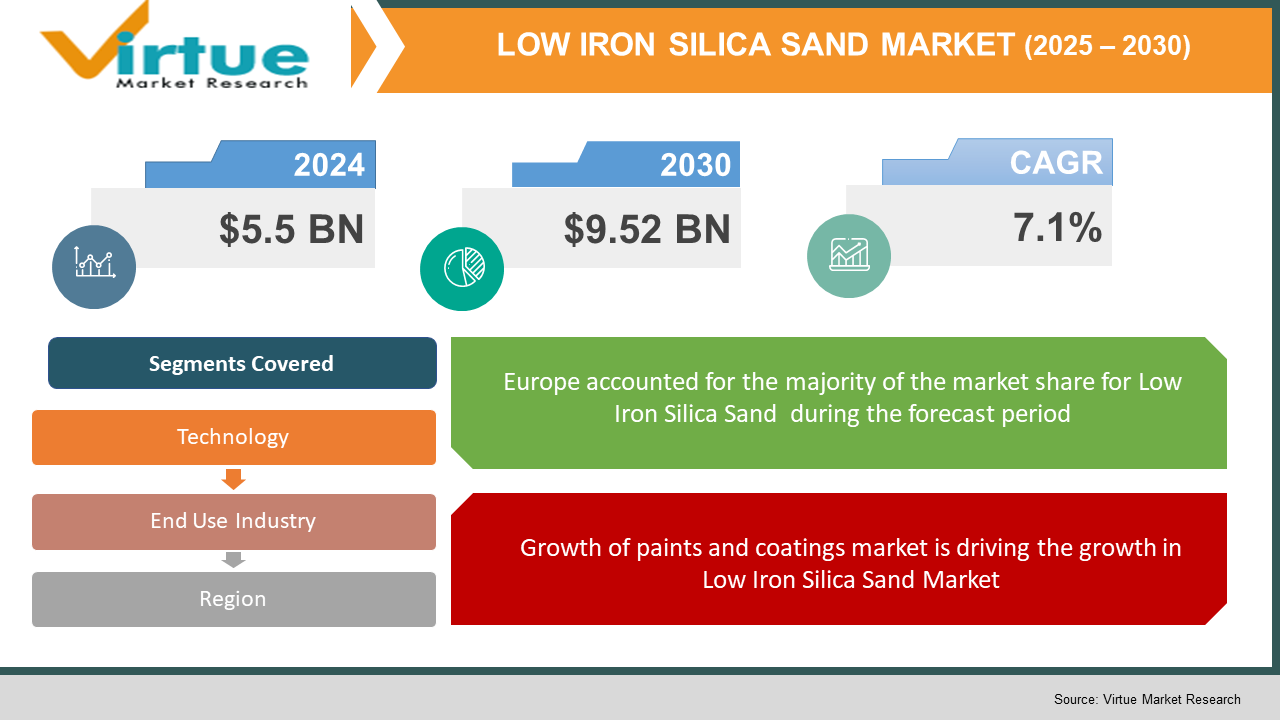Low Iron Silica Sand Market Size (2023 - 2030)
Global Low Iron Silica Sand Market size was valued at USD 5.5 Billion in 2022 and is projected to reach USD 9.52 Billion by 2030. Over the forecast period of 2023-2030, the market is projected to grow at a CAGR of 7.1%.

Industry Overview:
The Low Iron Silica Sand market has been growing steadily from the past few years due to increase in growth of its end use industries. Low Iron Silica is used in multiple industries. It is used as a raw material in these industries. Due to increase in consumer spending these secondary markets are expanding which is leading to an increased demand of silica in the market. There is a growing trend of EV automotives. EV automotives are the vehicles which are powered by the electricity. Due to depleting fossil fuels, increasing pollution, greenhouse gas emissions, and increasing global temperature, there have been changes in the climate. These changes in the climate are raising sea levels which are happening due to melting of ice in the Antarctic region. To prevent these environmental changes, organizations around the world, both public and private are shifting their core focus on alternative fuel vehicles or EVs. The major automotive companies in the world have increased their expenditure on research and development to come up with new innovations. Apart from this, there has been an increase in the awareness of people about climatic issues and global warming. Consumers are now more responsible about their choices; hence, they are shifting to environment friendly products and services. Due to these reasons, there has been a growing adaptability of EVs. The huge surge in EVs has increased the demand of good quality tires which are made from Low Iron Silica Sand. This is one of the major reasons behind the growth of the Low Iron Silica Sand Market.
COVID-19 Impact:
The COVID-19 impacted and stalled the Low Iron Silica Sand manufacturing due to issues in the supply chain and unavailability of labour. The COVID-19 pandemic forced countries around the world to shut down their manufacturing plants temporarily. This was done in order to prevent the spread of the virus. Hence, the workers and staff went into quarantine. People were staying in their homes and avoiding going to work or public places to contain the spread of the virus, due to this the manufacturing of Low Iron Silica Sand market has suffered. The market declined during the pandemic, but after lifting the lockdowns the market has picked up growth.
MARKET DRIVERS
Growth of paints and coatings market is driving the growth in Low Iron Silica Sand Market
Due to increase in construction of houses and real estate the demand for paints and coatings is increasing. Paints and coatings use Low Iron Silica Sand as a raw material which increases its quality and life. The consumer income has increased which has enabled them to invest in real estate. People are now buying their own homes instead of renting apartments and flats. There has been an increase in the shifting of people from rural places to big cities. This has caused a surge in the demand of home décor products such as paintings and coatings. Hence, it is driving the growth in Low Iron Silica Sand market.
Growth of oral care sector is driving the growth in Low Iron Silica Sand Market
Low Iron Silica is an important component of toothpastes and tooth powders. These help in better cleansing of the teeth. The market penetration for the oral care sector has increased due to increase in the awareness about dental health. Many developing and under developed companies still lack oral care. But there has been a significant improvement in these regions. Due to this the demand for toothpaste raw material Low Iron Silica Sand has increased and is an important driving factor behind the growth of the industry.
MARKET RESTRAINTS
Strict government policies are restraining the growth in the Low Iron Silica Sand Market
Strict government policies against the manufacturing of silica are limiting the growth of the market. The silica industry causes a lot of waste which is distributed into water bodies. This waste then harms the life of the animals in the water. The industry is facing strict policies by the government which restricts its operations to control the pollution caused by the industry. Hence, strict government policies are restraining the growth in the Low Iron Silica Sand market.
Introduction of green manufacturing techniques is restraining the growth in the Low Iron Silica Sand Market
The green manufacturing techniques are capital intensive and cannot be adapted by smaller manufacturing firms quickly. These technologies are quickly being adapted in the developed world. There has been huge investment being put into the industry. The government has also supported the manufacturers by providing them various subsidies. The firms were also supported through various production linked incentive schemes.
LOW IRON SILICA SAND MARKET REPORT COVERAGE:
|
REPORT METRIC |
DETAILS |
|
Market Size Available |
2022 - 2030 |
|
Base Year |
2022 |
|
Forecast Period |
2023 - 2030 |
|
CAGR |
7.1% |
|
Segments Covered |
By Technology, End use Industry, and Region |
|
Various Analyses Covered |
Global, Regional & Country Level Analysis, Segment-Level Analysis, DROC, PESTLE Analysis, Porter’s Five Forces Analysis, Competitive Landscape, Analyst Overview on Investment Opportunities |
|
Regional Scope |
North America, Europe, APAC, Latin America, Middle East & Africa |
|
Key Companies Profiled |
Elkem, Evonik Industries AG, Oriental and Silicas Corporation |
This research report on the global Low Iron Silica Sand Market has been segmented and sub-segmented based on technology, end use industry and region.
Low Iron Silica Sand market segmentation – By Technology
- Hydrophilic Fumed Silica
- Hydrophobic Fumed Silica
In terms of technology Low Iron Silica Sand Market can be divided into two main categories, hydrophilic fumed silica and hydrophobic fumed silica. Hydrophilic fumed silica is used in anti-setting and thickening agent. Whereas hydrophobic fumed silica is used in coatings, paints, adhesives, gels etc. Silica is a good adsorbent and can be used to adsorb moisture from the environment. These properties of silica can be utilized for drying.
Low Iron Silica Sand market segmentation – By End Use Industry
- Silicone Rubber
- Paints & Coatings
- Unsaturated Polyester Resins
- Adhesives & Sealants
- Healthcare & Personal Care
- Others
Low Iron Silica Sand is used in a number of industries. In terms of end use industry Low Iron Silica Sand is used in Silicone Rubber, Paints & Coatings, Unsaturated Polyester Resins, Adhesives & Sealants, Healthcare & Personal Care, and Others. Silica is majorly used to make rubbers of good quality. They are used to make tire rubber which is long lasting in nature and durable. Paints and coatings make use of silica to maintain good quality. Silica is used extensively in healthcare to make capsules and tablets. It helps in anticaking of the tablets and the capsules. They also have the property of being a glidant and adsorbent.
Low Iron Silica Sand market segmentation – By Region
- North America
- Europe
- Asia-Pacific
- Rest of the World
- Middle East and Africa
The European region has recorded significant growth in the Low Iron Silica Sand Market. This is due to increase in the manufacturing of EVs. The EVs have in turn propelled the demand for the silica rubber tires which is important for the durability and life of the tires. Asia-Pacific is the fastest growing region due to various production linked schemes set up by the governments in the regions to support growth.
Low Iron Silica Sand market segmentation – By Company
One of the major companies in Low Iron Silica Sand market are
- Elkem
- Evonik Industries AG
- Oriental and Silicas Corporation.
These companies have been involved in the market for a long time. The market is a specialized market and is very competitive in nature. The entry to barriers in the industry are very high as the industry is capital intensive. Due to recent issues with the fluctuation of prices of oil the firms faced problems with the supply chain. The overall production cost shot up.
NOTABLE HAPPENINGS IN THE LOW IRON SILICA SAND MARKET IN THE RECENT PAST:
- In October 2021, Evonik got into joint venture with Wynca to start its new silica plant in China. The brand name of the joint venture is AEROSIL.
- In June 2021, Evonik made a purchase agreement to acquire InfinitecActivos, which is a privately owned company.
- In May 2021, Cabot Oil & Gas Corp. signed a merger agreement with Cimarex Energy. The deal merged the two companies and the total valuation of the company was USD 17 bn.
Chapter 1. GLOBAL LOW IRON SILICA SAND MARKET – Scope & Methodology
1.1. Market Segmentation
1.2. Assumptions
1.3. Research Methodology
1.4. Primary Sources
1.5. Secondary Sources
Chapter 2. GLOBAL LOW IRON SILICA SAND MARKET – Executive Summary
2.1. Market Size & Forecast – (2023 – 2030) ($M/$Bn)
2.2. Key Trends & Insights
2.3. COVID-19 Impact Analysis
2.3.1. Impact during 2030 - 2030
2.3.2. Impact on Supply – Demand
Chapter 3. GLOBAL LOW IRON SILICA SAND MARKET – Competition Scenario
3.1. Market Share Analysis
3.2. Product Benchmarking
3.3. Competitive Strategy & Development Scenario
3.4. Competitive Pricing Analysis
3.5. Supplier - Distributor Analysis
Chapter 4. GLOBAL LOW IRON SILICA SAND MARKET - Entry Scenario
4.1. Case Studies – Start-up/Thriving Companies
4.2. Regulatory Scenario - By Region
4.3 Customer Analysis
4.4. Porter's Five Force Model
4.4.1. Bargaining Power of Suppliers
4.4.2. Bargaining Powers of Customers
4.4.3. Threat of New Entrants
4.4.4. Rivalry among Existing Players
4.4.5. Threat of Substitutes
Chapter 5. GLOBAL LOW IRON SILICA SAND MARKET - Landscape
5.1. Value Chain Analysis – Key Stakeholders Impact Analysis
5.2. Market Drivers
5.3. Market Restraints/Challenges
5.4. Market Opportunities
Chapter 6. GLOBAL LOW IRON SILICA SAND MARKET – By Technology
6.1. Hydrophilic Fumed Silica
6.2. Hydrophobic Fumed Silica
Chapter 7. GLOBAL LOW IRON SILICA SAND MARKET – By End Use Industry
7.1. Silicone Rubber
7.2. Paints & Coatings
7.3. Unsaturated Polyester Resins
7.4. Adhesives & Sealants
7.5. Healthcare & Personal Care
7.6. Others
Chapter 8. GLOBAL LOW IRON SILICA SAND MARKET – By Region
8.1. North America
8.2. Europe
8.3. The Asia Pacific
8.4. Latin America
8.5. Middle-East and Africa
Chapter 9. GLOBAL LOW IRON SILICA SAND MARKET – Company Profiles – (Overview, Product Portfolio, Financials, Developments)
9.1. Elkem
9.2. Evonik Industries AG
9.3. Oriental and Silicas Corporation
Download Sample
Choose License Type
2500
4250
5250
6900



